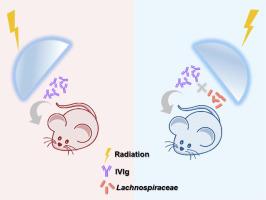Journal of Advanced Research ( IF 11.4 ) Pub Date : 2022-06-11 , DOI: 10.1016/j.jare.2022.06.002 Zongkui Wang 1 , Huiwen Xiao 2 , Jiali Dong 3 , Yuan Li 3 , Bin Wang 3 , Zhiyuan Chen 3 , Xiaozhou Zeng 3 , Jia Liu 2 , Yanxi Dong 3 , Li Ma 1 , Jun Xu 4 , Lu Cheng 4 , Changqing Li 1 , Xingzhong Liu 2 , Ming Cui 3

|
Introduction
With the mounting number of cancer survivors, the complications following cancer treatment become novel conundrums and starve for countermeasures. Intravenous immunoglobulin (IVIg) is a purified preparation for immune-deficient and autoimmune conditions.
Objectives
Here, we investigated whether IVIg could be employed to fight against radiation injuries and explored the underlying mechanism.
Methods
Hematopoietic or gastrointestinal (GI) tract toxicity was induced by total body or abdominal local irradiation. High-throughput sequencing was performed to analyze the gut microbiota configurations and gene expression profile of small intestine. The untargeted metabolomics of gut microbiome was assessed by liquid chromatography coupled to tandem mass spectrometry (LC-MS/MS) analyses. Hydrodynamic-based gene delivery was used to knockdown the target genes in vivo.
Results
Intravenous injection of IVIg protected against radiation-induced hematopoietic and GI tract toxicity in female mice but not in males. IVIg structured sex-characteristic gut microbiota configurations in abdominal irradiated mice. The irradiation enriched gut Lachnospiraceae in female mice but reduced those in males. IVIg injection combined with oral gavage of Lachnospiraceae or its metabolite hypoxanthine, alleviated radiation toxicity in male mice however, Lachnospiraceae or hypoxanthine alone failed to ameliorate the injuries. Abdominal local irradiation drove sex-distinct gene expression signatures in small intestine. Mechanistic investigation showed that replenishment of Lachnospiraceae or hypoxanthine offset abdominal radiation-reduced PLD1 expression in male mice. In females, irradiation elevated PLD1 expression. Deletion of PLD1 in GI tract of female mice erased the radioprotective effects of IVIg.
Conclusion
IVIg battles against radiation injuries in a sex-specific, gut microbiome-dependent way through Lachnospiraceae/hypoxanthine/PLD1 axis. Our findings provide a sex-precise therapeutic avenue to improve the prognosis of cancer patients with radiotherapy in pre-clinical settings.
中文翻译:

肠道微生物群的性别二态性决定了静脉注射免疫球蛋白对放疗并发症的治疗效果
介绍
随着癌症幸存者人数的增加,癌症治疗后的并发症成为新的难题,急需对策。静脉注射免疫球蛋白 (IVIg) 是一种用于免疫缺陷和自身免疫性疾病的纯化制剂。
目标
在这里,我们调查了 IVIg 是否可以用于对抗辐射损伤并探索了潜在的机制。
方法
全身或腹部局部照射会引起造血或胃肠道 (GI) 道毒性。进行了高通量测序以分析小肠的肠道微生物群结构和基因表达谱。通过液相色谱与串联质谱 (LC-MS/MS) 分析评估肠道微生物组的非靶向代谢组学。基于流体动力学的基因传递用于在体内敲低目标基因。
结果
静脉注射 IVIg 可以保护雌性小鼠免受辐射诱导的造血和胃肠道毒性,但不能保护雄性小鼠。IVIg 结构化腹部受照小鼠的性别特征肠道微生物群配置。辐射丰富了雌性小鼠的肠道毛螺菌科,但减少了雄性小鼠的肠道毛螺菌科。IVIg注射联合灌胃毛螺菌科或其代谢物次黄嘌呤可减轻雄性小鼠的辐射毒性,但单独使用毛螺菌科或次黄嘌呤无法改善损伤。腹部局部照射驱动小肠中性别不同的基因表达特征。机理研究表明,毛螺菌科的补充或次黄嘌呤抵消了雄性小鼠腹部辐射降低的 PLD1 表达。在女性中,辐射提高了 PLD1 的表达。雌性小鼠胃肠道中 PLD1 的缺失消除了 IVIg 的辐射防护作用。
结论
IVIg 通过毛螺菌科/次黄嘌呤/PLD1 轴以性别特异性、肠道微生物组依赖性方式对抗辐射损伤。我们的研究结果提供了一种性别精确的治疗途径,可以改善临床前放疗癌症患者的预后。









































 京公网安备 11010802027423号
京公网安备 11010802027423号